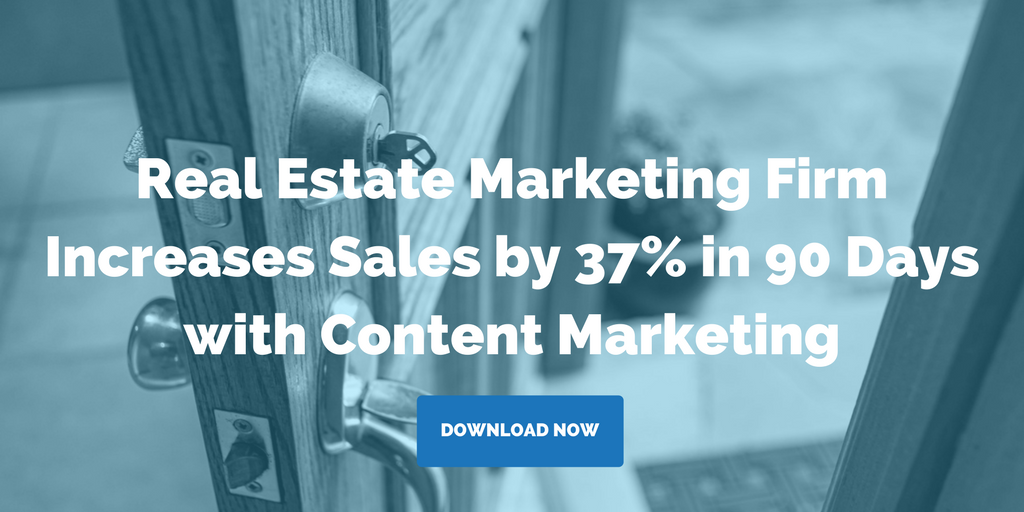Posts Tagged "digital advertising"

Paid Digital Advertising: A Beginner’s Guide for Real Estate Marketers
Paid digital advertising can help accelerate your content marketing efforts so that your content gets in front of prospective buyers and renters faster than would happen organically.
We are strong believers in content marketing. Build it, and they will come — or, in content-marketing speak, publish quality content, and buyers will come to you. But, content marketing takes time to bear fruit. There’s not much you can do about that.
Except paid digital advertising.
By investing in paid digital advertising, you can boost the reach of your posts, display ads, and videos. Pair quality content with a comprehensive digital advertising strategy, and you will be in a position to drive more traffic, create more brand visibility, and sell or lease more properties.
Your peers understand this. Within the first quarter of 2017, Facebook, Instagram, Twitter, LinkedIn, Snapchat, and Pinterest saw a 61.5% increase in paid media spend. And that’s only going to increase through 2018.
So where do you start? Here are three places to get started in using paid digital advertising to help market your property.
3 paid digital advertising platforms
1) Display ads
Display ads are the paid advertisements that appear in front of users on website pages in the form of graphics. Unlike text-based ads, display advertising relies on elements such as images, audio, and video to communicate an advertising message. Display ads are commonly referred to as banner ads, but they don’t always take banner form. They can come in all shapes and sizes, and can appear anywhere on a webpage.
Benefits: Because digital ads are visual, they can be customized with your logo, message, images of properties, or an offer to help increase brand awareness. You have the ability to use graphics, video, and audio to really stand out and highlight your properties. Display ads also allow users the ability to target a specific audience. You control which sites they appear on, which geographic area they appear in, and which demographic or niche market they appear to — all valuable tools for the real estate marketer.
2) Sponsored social media posts
There are sponsored posts plus other ad opportunities like Facebook like campaigns, website click ads, and lead ads.
Social media is a natural place to begin if you’re looking to get into paid digital advertising, particularly for the real estate industry. A good starting point is Facebook. The social media giant’s social ad revenue was more than $9.16 billion in Q2 2017 alone. And it doesn’t stop there. Twitter brought in $548 million in social media advertising revenue in the same period, and Snapchat is expected to reach over $895.5 million in ad revenue in 2017.
More specifically, three of the most useful types of sponsored social media posts for real estate marketing are:
- Facebook Like Campaigns: These campaigns are aimed directly at increasing the number of likes for a Facebook page, targeting people who might be interested in your brand and the posts you share on Facebook.
- Facebook Website Click Ads: These are ads that point people on Facebook to your website, or even the listings for specific properties.
- Facebook Lead Ads: These ads allow users to request information, estimates, or newsletters without leaving Facebook. Requiring fewer steps of prospective leads increases conversion rates.
Benefits: Running paid social ads allows you to reach a large audience at a low cost. You pay based on the type of ad you’re running. For example, if you’re looking to drive brand awareness, you’ll incur a CPM (Cost Per 1,000 Impressions). And not only are the ads relatively inexpensive to run, they’re not expensive to create. You get all of this plus the ability to target your specific audience, reaching people that are interested in learning about the properties you have to offer.
3) Google AdWords
Google AdWords places your website as one of the top results on a search engine results page (SERP) when a user searches for certain keywords of your choice. When a user clicks the AdWords link or calls your business using that link, you incur a charge (pay-per-click). Otherwise, impressions are free.
Google’s most recent update involves changes to the so-called “3-pack,” or the listing of three related local businesses on a search results page. Many users rely on the 3-pack to discover businesses in their area that offer the products and services they are seeking. This is particularly helpful for users searching for local real estate. And real estate copanies get the benefit of many additional leads and investors when they appear in the 3-pack.
Benefits: The biggest benefit of Google AdWords is its speed. You appear in a top spot in a user’s search results, meaning you are one of the first things a user sees when searching for a specific location or property keyword. That’s another good point: Google AdWords allows you to focus on people who are searching for what you have to offer, so you don’t pay for a bunch of wasted impressions — particularly valuable in real estate marketing, where geography is key. AdWords also gives you real-time reports to track your ad’s success. A dashboard shows information related to each campaign, such as the ads clicked, keywords entered by website visitors, cost of clicks and much more.
Related posts:
- How Pay-Per-Click Helped This Property Get 54 Leads
-
Learn How Content Marketing Increased Real Estate Sales by 37% in 90 Days
-
Using Content Marketing to Market and Sell Luxury Real Estate
Posts Tagged "digital advertising"

These are the Busiest Day of the Year for Real Estate Searches
Real estate searches peak the weekend after Thanksgiving, December 28, January 1, and July 6, so don’t stop marketing your property during the holidays.
If you’re a marketing professional outside the retail industry, chances are you slow things down during the holidays. But before you settle in for a second helping of leftovers, consider this: according to a study by Realtor.com, December 28 is statistically one of the busiest days for real estate searches.
It makes sense: Potential buyers use their post-holiday downtime to consider real estate investment. Other days when real estate searches spike include:
- the weekend after Thanksgiving
- New Year’s Day
- July 6
It’s important for real estate marketers to be aware of these dates so that you don’t stop all your marketing activities. The good news is that real estate searches are typically lowest on actual holidays, so putting a pause on your pay-per-click advertising, for example, on those days makes sense.
I bring this up because, recently, a client asked to stop all marketing activities between mid-December and New Year’s Day due to “seasonal decline” in sales. While it’s true that December typically sees lower numbers in terms of web traffic, leads, and conversions, that doesn’t mean there is not enormous, largely untapped opportunities for this client — if we are strategic about how we spend marketing dollars over the holidays.
Leveraging the post-holiday uptick in real estate searches
While spending the holidays relaxing with family and friends is something we all deserve, keeping a few strategic marketing activities going can mean big wins for your property/properties. Here are a few things I recommend, and why.
1) Publish blog posts on a normal schedule.
Blog posts are the gifts that keep on giving, meaning the majority of traffic will visit your posts months after they’re published. In fact, 80% of our page views occur on blog posts published at least 6 months prior. It’s a great time to write about trends or happenings in the coming year in an effort to capture future searches.
Search engines value consistency in your publishing schedule, so keeping up your normal posting frequency will help your rankings. If you have the resources to post on schedule, it would benefit you to do so.
2) Be strategic about social media.
Social media management can be time-consuming, so you should dial back your posting on the days you know prospects won’t be spending much time online (e.g. December 25). That being said, you should plan to post on days when you know real estate searches peak (e.g. December 28). Chances are, many of your competitors will be shut down for the holiday, and your posts will be front and center in your prospects’ newsfeeds.
3) Be strategic about digital advertising.
The same goes for digital advertising. Knowing that post-holiday real estate searches peak on December 28, you should budget your pay-per-click and social advertising dollars to spend more on this day. Particularly focus on your Google AdWords spend because that will capture prospects using search engines to find information about potential real estate investments — as opposed to sponsored social posts, which display your ads in the newsfeed of a prospect who may or may not be ready to buy.
Related posts:
-
4 Tools for Determining the Best Time to Post on Social Media for Your Property
-
Peak Season Demands Real-Time Analytics for Perfect Fulfillment



